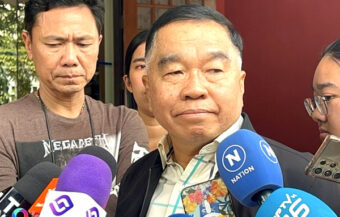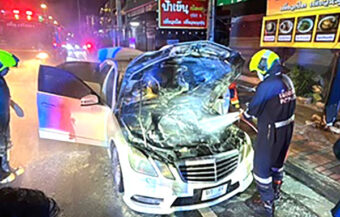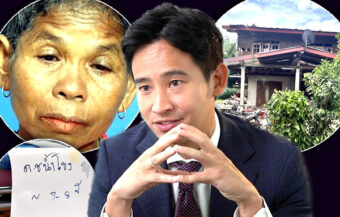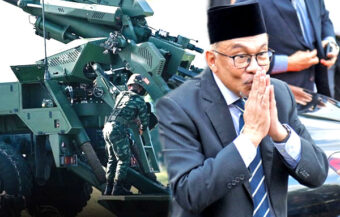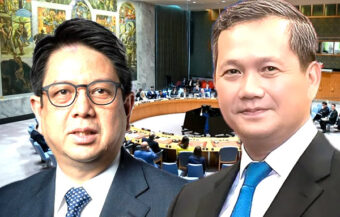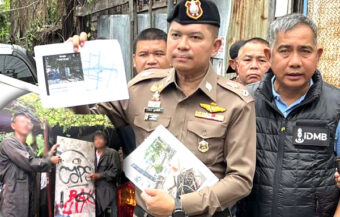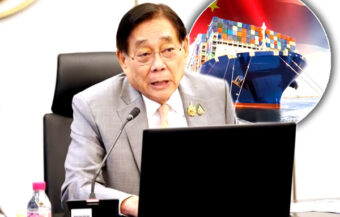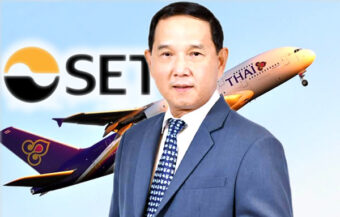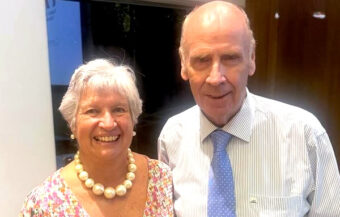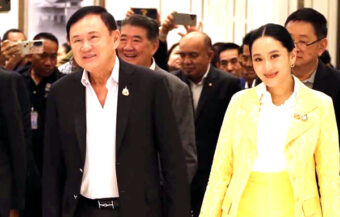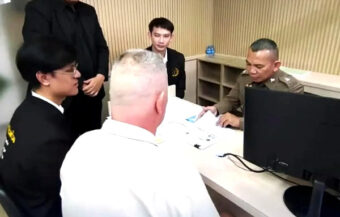Thai PM working to spark EV Revolution for Thailand in Japan. Srettha woos auto giants for a brighter and green future. The extended visit is part of a pivot to unleash Thailand’s power in the global EV market and a resurgent motor industry.
Thailand’s Prime Minister Srettha Thavisin set off early for Japan on Friday on a packed four-day trip. It will see him attend the Japan-Asean Summit but the key mission is to have talks with Japanese firms. These will touch on transitioning Thailand’s critical auto industry to EV production models and more advanced manufacturing plants. Mr Srettha will also speak to Toyoya chiefs about consumer financing. This is understood to be part of his government’s plans to alleviate the Kingdom’s chronic problems with household debt.
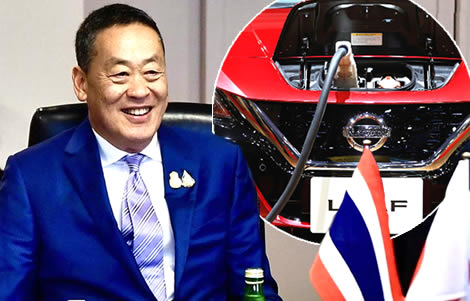
In what he sees as a pivotal move, Prime Minister, Srettha Thavisin is on an extended trip to Japan. He left on Friday morning from Don Mueang Airport.
His mission—to position Thailand as a global leader in electric vehicle (EV) manufacturing and to attract green investment. Despite facing economic headwinds, Prime Minister Srettha’s relentless commitment to reshaping Thailand’s economic future has been evident since he assumed office at the end of August.
Trip is not just a diplomatic junket. Japan has been Thailand’s major investor for over a half-century and is the key to transforming the auto industry
The Prime Minister’s trip is not just a diplomatic formality or junket. It is a strategic and concerted effort to boost inward investment. This is a critical component of Thailand’s economic revival. Japan, has been Thailand’s largest investor over the last half-century.
It holds a key position, especially in the automotive sector, which is central to the Prime Minister’s ambitious plans.
Accompanying Prime Minister Srettha is the Minister of Transport, Suriya Jungrungruangkit.
This further emphasises the paramount importance of the automotive sector in the course of this trip. The goal is clear: to leverage longstanding ties with Japan and persuade major Japanese firms to reinvest in Thailand’s vitally important automotive industry.
Prime Minister to attend the Japan-Asean Summit
The Prime Minister’s trip coincides with the special ASEAN-Japan Summit in Tokyo, marking the 50th anniversary of ASEAN-Japan relations. The significance of the summit is the chance to meet top Japanese business leaders. By the same token, the potential for fruitful economic collaboration is high.
It runs from the 14th to the 18th of December.
Certainly, Prime Minister Srettha seeks engagement with influential Japanese entities, including Panasonic, and major automotive players such as Mitsui, Suzuki, Mazda, Honda, and Nissan. The focus is on encouraging additional investments, especially in the rapidly evolving EV sector.
Land Bridge to PM Srettha’s economic policy dreams on the agenda with a 2029 launch date
Meanwhile, in an exchange with reporters, Prime Minister Srettha highlighted the colossal scale of Japan’s investment in Thailand.
It amounts to trillions in output and hundreds of billions of baht in investments over several decades. High-level discussions will reflect Thailand’s economic agenda, green energy, electronic component manufacturing, and mega projects like the Southern Land Bridge Project.
Srettha to speak in person with top motor industry leaders in Japan on plans to invest in EV production in Thailand as the kingdom bets on the future
Significantly, the Prime Minister’s itinerary includes meetings with Mitsui Group, Japan’s largest conglomerate, exploring opportunities in natural gas field exploration and the potential use of used vegetable oil for jet fuel production—a testament to the multifaceted nature of industrial development in Thailand.
However, the focal point of the trip revolves around Thailand’s automotive industry.
Srettha is determined to engage with seven major Japanese car companies, including Honda, Nissan, Mitsubishi, Suzuki, Isuzu, Mazda, and Toyota.
Later, the PM plans to urge these firms, giants in the industry, to expedite the production of EVs in Thailand. There are already encouraging signs with ambitious plans involving tens of billions of baht.
Honda pledges a substantial investment of ฿50 billion over the next five years. The firm assures the Prime Minister about its commitment to transitioning from combustion engine cars to EVs.
The PM wants to see a full range of EV vehicles being produced as well as sold and marketed in Thailand as Japanese firms prepare to invest tens of billions
As well as that, Nissan, a pioneer in EV production in Thailand, affirmed its dedication to continuing the trend. Mitsubishi, focusing on EV pickup trucks, was encouraged to accelerate its investment plans. This is in view of the popularity of pickups in the Thai market.
Additionally, Suzuki, known for its eco-friendly cars, proposes the production of electric motorcycles, citing Thailand’s strong market.
Isuzu expressed readiness to invest over ฿32 billion in the next five years, building upon its substantial past investments. Mazda, already using Thailand as a production base, says it has confidence in Thai-made SUVs’ performance for the global market.
At this time, also, Toyota, a major player in Thailand’s automotive manufacturing sector for 60 years, shared its plans to produce EV pickup trucks by 2025. Prime Minister Srettha expressed concern about the limited production quantity, urging Toyota to expedite its efforts.
At the same time, he emphasised the need for a robust network of electric car charging stations across the country. He will assure the vehicle makers that his government plans to address the issue.
Talks with Toyota to touch on consumer finance
The Prime Minister’s discussions will not only focus on attracting investments.
As a matter of fact, he will also be talking about financing and consumer debt. Acknowledging the role of Toyota in Thailand’s automotive future, he seeks collaboration on car finance. The PM hopes to alleviate the financial burden on consumers.
Earlier, in a press conference, Prime Minister Srettha underscored the primary objectives of his visit: accelerating each company’s investment in EVs and emphasising the use of clean energy. The focus aligns with the special ASEAN-Japan Summit, marking the 50th anniversary of ASEAN-Japan relations.
First day in Tokyo went well with a friendly and supportive atmosphere as the PM talked about swift implementation and executing EV investment plans
On the first day on Friday, the PM stayed at the prestigious Imperial Hotel in Tokyo.
Reflecting on discussions with Japanese businessmen, Mr Srrettha expressed satisfaction with the friendly and positive atmosphere.
At the same time, while he acknowledged the challenges of a changing world, he reiterated the government’s commitment to swiftly executing successful projects. The Board of Investment (BOI) has meticulously prepared information to facilitate these discussions.
Undeniably, Prime Minister Srettha’s trip to Japan is not just a diplomatic tour but a strategic move to reshape Thailand’s economic future. With a keen emphasis on EV manufacturing and green investments, he is not only courting Japanese money but positioning Thailand as a pivotal player in the global electric vehicle market.
Join the Thai News forum, follow Thai Examiner on Facebook here
Receive all our stories as they come out on Telegram here
Follow Thai Examiner here
Further reading:
Land Bridge to PM Srettha’s economic policy dreams on the agenda with a 2029 launch date
Transport ministry looks at launching Thailand’s own shipping line to support economic growth
RCEP deal agreed as India opts out – busy Bangkok ASEAN summit concludes on a low-key

